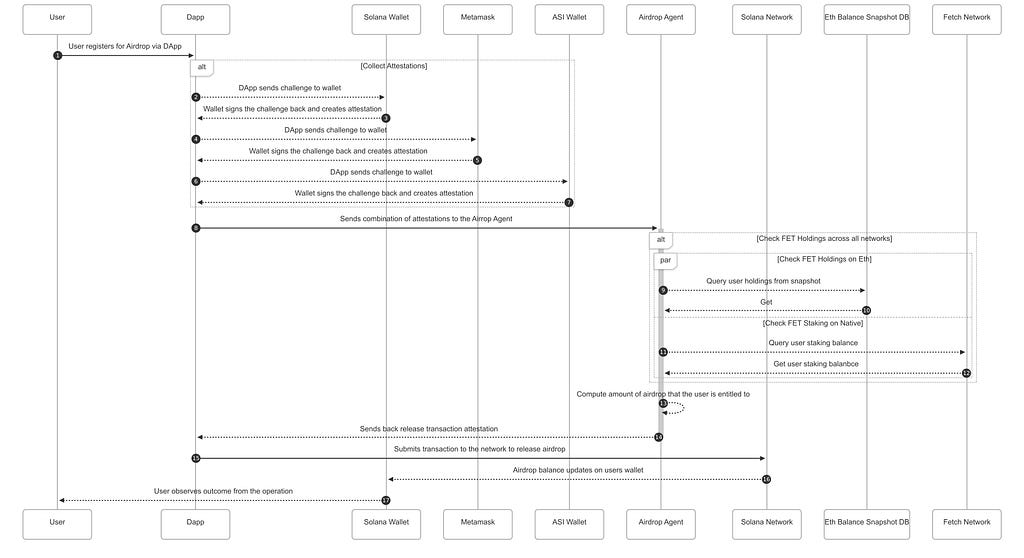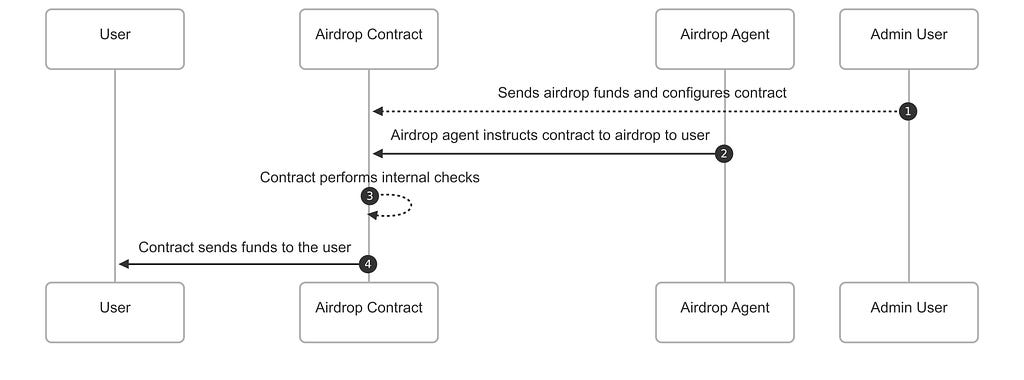


0
0
Designing a Scalable and Secure Airdrop System with Fetch.ai Agent Technology
Airdrops have become a popular strategy in Web3 — used to reward users, promote community engagement, and bootstrap token ecosystems. However, distributing tokens across multiple blockchain networks (like Ethereum, Solana, and Fetch.ai) introduces challenges:
In this post, we’ll show you how to design a cross-chain, agent-based airdrop system using Fetch.ai’s agent framework. This approach enables:
Let’s walk through the entire system from start to finish.
We’ll build a decentralized airdrop flow with the following steps:
Here’s how the full flow looks visually:

The smart contract is designed to:
This ensures:

To prove wallet ownership across chains, the user must sign a challenge message with each wallet. These signatures form attestations and are sent to the agent.
Here’s the data structure used for registering a user:
class AttestationContent(BaseModel):
validFrom: str
validTo: str
fetchNativeAddress: str
ethAddress: str
solanaAddress: str
class Attestation(BaseModel):
network: Literal['fetch', 'eth', 'solana']
signature: str # base64 encoded signature
class AirdropRegistration(BaseModel):
attestation: AttestationContent
attestations: list[Attestation]
This data structure includes:
The Airdrop Agent uses this data to verify that all addresses belong to the same user.
Before signing, the attestation content is encoded using a consistent and deterministic format to ensure cross-platform compatibility.
import struct
def encode_string(value: str) -> bytes:
"""Encodes a string with an 8-byte length prefix."""
return struct.pack('>Q', len(value)) + value.encode('utf8')
def encode_attestation(atte: AttestationContent) -> bytes:
fields = [
atte.validFrom,
atte.validTo,
atte.fetchNativeAddress,
atte.ethAddress,
atte.solanaAddress,
]
encoded = b""
for field in fields:
encoded += encode_string(field)
return encoded
The signature can then be generated by signing the output of the encode_attestation function. The signature should be base64 encoded into the final Attestation structure.
Once wallet ownership is verified and token holdings are confirmed, the Airdrop Agent computes the airdrop amount and generates a release attestation:
class ReleaseAttestation(BaseModel):
destination: str # The user's wallet address
amount: str # Amount of Token A
signature: str # Signed by Airdrop Agent's private key
The above is the attestation that should be generated from the airdrop agent. Specifically the destination and amount fields will need to be encoded and signed. In addition, we need to verify that on the SVM the attestation can be verified correctly to release the funds.
Once the release attestation is received, the smart contract performs the following steps:
This makes the entire token distribution autonomous, secure, and fully auditable on-chain.
Agent-based airdrops are a significant upgrade over manual distribution tools. This system design is:
With Fetch.ai’s agent framework, you can automate identity checks, verify balances, and issue airdrops programmatically — all without maintaining off-chain servers or relying on centralized validators.
Whether you’re launching a new token, rewarding stakers, or running a governance campaign — agent-based infrastructure gives you complete control, flexibility, and security.
Ready to explore what’s possible with agent-based automation?
The uAgents Framework by Fetch.ai makes it simple to build intelligent, event-driven, and secure agents in Python. Whether you’re automating cross-chain airdrops, building decentralized coordination tools, or exploring agent-based trading, uAgents gives you the power to move fast and build autonomously.
uAgents is an open-source Python library designed for creating autonomous AI agents. With intuitive decorators and event-driven patterns, you can build agents that:
It’s lightweight, flexible, and built for real-world applications in Web3 and beyond.Key Resources
We’d love to support your journey.
Whether you’re just exploring or already building, our team and community can help you with:
Have a project or idea in mind?
👉 Join the Fetch.ai Discord to connect with the team, ask questions, and start building. We’re excited to see what you create.
#BUIDLFETCH 🚀
Agent-Based Airdrops Across Chains was originally published in Fetch.ai on Medium, where people are continuing the conversation by highlighting and responding to this story.
0
0
 Gerencie todo seu criptograma, NFT e DeFi de um só lugar
Gerencie todo seu criptograma, NFT e DeFi de um só lugarConecte com segurança o portfólio que você está usando para começar.